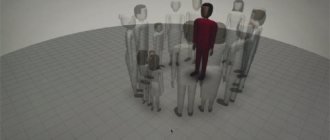Admit it, have you ever met people who blush at the slightest reason? Surely there are several of your friends like this, and maybe you yourself are embarrassed about something or are very worried, and therefore blush when you don’t need to. In fact, it’s easy to avoid this problem if you figure out why a person blushes? Does this happen because of embarrassment, awkwardness, shame? What should you do in order not to blush at an inconvenient moment, and how to quickly pull yourself together? Let's figure it out together.
Is this a problem or can we live with it in peace?
Just a couple of centuries ago, red cheeks did not cause anyone to laugh or feel embarrassed - this was considered the standard of beauty of that time, and young girls deliberately painted bright red cheeks with blush in order to look as beautiful and sweet as possible. Now the perception of beauty has changed dramatically, and now red cheeks are not a standard and are even considered a problem. Many, having heard about the problem of reddening of the cheeks during excitement or embarrassment, will consider that this is not such a global problem that it needs to be solved. But the minority will still agree that cheeks that are red from excitement, and sometimes even the chest, ears, nose, shoulders, forehead and eyes, are a process of the body that is completely beyond their control, and this pretty much ruins their life.
People who face this problem know how much it affects self-esteem and self-confidence, and how much it forces them to refuse higher positions at work or speaking in public. So why does a person’s face turn red and how to avoid it?
People who blush are more reliable
According to a behavioral study that was published in the Journal of Personality and Social Psychology, people who blush easily are more trustworthy compared to those who do not react in the same way. They are more sincere and open. Blushing people are also considered the most generous. Researchers in this study confirm that other forms of expression of shame and mild social vulnerability are indeed signs of virtue, since it is impossible to voluntarily reproduce these reactions.
For Svetlana, he left his first wife and daughter: Valdis Pelsh’s second family (photo)
The Central Bank named the regions of Russia with the most expensive and cheapest mortgages
Mini braids: quick simple hairstyles for a walk or remote work
Causes of red cheeks and damaged self-esteem
First of all, redness of any part of the body at a time when you are worried or embarrassed, or generally experiencing any strong emotions, is a feature of your nervous system. And this is absolutely normal, because someone’s body reacts with increased sweating, someone’s with instant paleness of the face, and someone’s with redness throughout the body or locally, only on the cheeks.
Have you ever wondered why people blush from embarrassment? Basically, the most important reason for facial redness is the shame and embarrassment that people experience who are unsure of themselves and their abilities. They are afraid of being offended, misunderstood, funny in the eyes of others, and this makes them worry and feel embarrassed.
Working with the body
The fear that we experience at such moments manifests itself in our body: we feel stiff, our breathing is constricted, some muscles are tense, others are completely relaxed. We lose control, the body does not listen. Maria Andrianova advises: “When you feel growing tension, lower your shoulders, relax as much as possible, stick your stomach forward a little and exhale. Hold your breath for a while, inhale as calmly as possible and exhale again to the count of five. Take several such calm breaths and long exhalations, relaxing your body. You will feel that your heart will beat calmer, your blood circulation will slow down, your blood vessels will narrow, and this will reduce blood flow.”
The most effective method that should not be abused
Have you noticed that you mostly blush only in front of other people, but you can’t do it alone? This is explained by the fact that you know that no one is looking at you, and you feel comfortable and confident, and you understand that no one will laugh at you, much less shame or offend you. As soon as you feel that you are about to blush, imagine a completely empty room or street in front of you, where there is no one, and, accordingly, there is no one to turn red on your cheeks.
This explains why a person blushes when he is excited. This method helps to cope with anxiety before public speaking, performances and monologues. But if you need to connect with people, your behavior will hit the iceberg of misunderstanding and you will fail.
That is why the best answer to the question of why a person blushes when he is embarrassed is the need to increase self-esteem. Having believed in your strength and in yourself, you will notice that over time, fear and embarrassment in front of people disappears. In addition, each person has his own cockroaches in his head - everyone is embarrassed about something, everyone has shortcomings, and that is why people have no reason to pay attention to your, often far-fetched, problems. It may well be that someone has several times more reasons for embarrassment and fear than you do, so it is generally inappropriate for you to think about the opinions of others. Be ready to love yourself and accept all your characteristics and differences from other people.
Physiological problems
If the problem with blushing is not related to psychology, then it means that it is physiology. There is a well-known disease called rosacea. It is a vascular pathology that appears due to poor blood circulation. Thus, the face can turn red not only with excitement and embarrassment, but also with temperature changes, heat, frost and other factors, and sometimes no reason is needed for this.
The pathology itself is not dangerous. The consequences of neglect are dangerous. If you do not pay attention to it, the vessels will burst, forming spider veins, very noticeable and difficult to disguise. In addition to rosacea, there are other physiological pathologies for which you should definitely contact a qualified doctor to take action.
The coward turns pale, the brave man blushes
To this day, there has been a special explanation for the question of why people blush when they are shy or embarrassed by something. In the Roman Empire there was such a custom as suddenly throwing a stick at the back of a future warrior. Gaius Julius Caesar, choosing soldiers for his army, observed their reaction. If the future warrior blushed, it meant that he was brave, fast, smart, desperate and selfless. But if a warrior turned pale, he was expelled from the army, because paleness was considered a sign of fear.
We are the only creatures that can blush
Only humans have the ability to blush, according to Darwin's findings. Animals were not awarded this ability. By observing monkeys' gestures and conducting evolutionary studies, he identified this response as "the most human of expressions." This is likely due to the social defense mechanism that people create against feelings such as guilt or shame.
Sigmund Freud, in his scientific work, pointed out that blushing is a complex reaction of the human body that occurs against the background of suppressed sexual desires. In fact, based on Freud’s opinion, blushing is a unique way of conveying to others about your erotic impulses.
What is the difference between “I’m sorry” and “I’m sorry” and why we always ask God to forgive
Cake “Fruit Paradise” with mascarpone cream: a recipe for a dessert with vanilla flavor
Why is it so difficult to learn to ask for help and how to overcome fear
Is the problem of sudden redness exaggerated?
If we rely on the research of psychologists, we can say that people prone to sudden redness have two problems. The first is blushing at the slightest reason, regardless of the situation and circumstances.
The second, in turn, is how a person reacts to the opinions of others and to his appearance. More often than not, the second problem turns out to be much more dangerous than the first, because people who are faced with it greatly limit their social circle, avoid meeting and talking with friends, and hide from society. As a result, social phobia arises - fear of communication and any contact with people. Social phobia is primarily caused by embarrassment and fear, and a person suffering from such a phobia increasingly wonders why people blush when they are shy or unsure about something. However, you should remember that you cannot guarantee how others will react to you, your appearance and your actions, so you should not worry about it.
Causes of redness
This usually happens to insecure people who feel shame or embarrassment. For example, when a person goes on stage or speaks at work in front of a group, when the conversation is about something intimate, or even if he unexpectedly met an acquaintance on the street, or someone asked a question that could confuse or lead to a dead end. As a result, the fear that everyone is laughing at him because of this, that no one will understand him, keeps him in constant tension. And it’s even harder because there’s no way to change it.
As a result, this begins to interfere with any contacts and relationships with people; the person does not want to talk to someone again, and tries to withdraw from society altogether. As a result, he becomes even more modest and withdrawn. All this is explained by social phobia. Even if a person does not look that shy, he may well have such a phobia, that is, a fear of communication.
Ask your friends about it
If you still wonder why people blush when they are embarrassed and attribute this problem to yourself, try an experiment. Ask your friends and acquaintances how often they notice your face turning red and what they think about it. Do you think they will start laughing at this and feel disgusted or disliked? Forget it! The answers from those who take the survey will likely surprise you. Some people don’t notice this at all, others understand that you are embarrassed, and blushing is normal, while others are generally touched by it.
Why does a healthy blush appear?
The skin of the face is supplied with blood and oxygen through small blood vessels called capillaries. They are located quite close to the surface of the skin. In the cold, the capillaries begin to narrow and the face turns pale. When a person comes into a warm room from the cold, the blood vessels dilate again and give the skin that same healthy glow.
Photo: istockphoto.com
In addition, the face may turn red:
- during physical exercise - due to active heat exchange;
- in stuffy rooms - the body strives to maintain oxygen exchange in the skin;
- when drinking alcoholic beverages, as well as hot and spicy foods.
In all these cases, the appearance of blush indicates normal physiological processes in the skin. They support the necessary heat and gas exchange.
Will sports damage your skin? How does exercise affect your face?
How to deal with red cheeks?
If you learn to live with redness, this problem will no longer bother you. Of course, if all else fails, you can just joke and laugh at yourself. Then others will no longer have a reason to joke or tease you.
Of course, you can try and work on the question of why a person blushes, but this requires practice and desire on your part. However, you will see results very soon if you do not put off eliminating the cause of your blush.
At first, even before your cheeks turn red, you feel a heat from within and an embarrassment that is growing with every second. After realizing this, you feel embarrassed, and of course, you blush even more. But this chain can really be broken.
Blushing people have a habit of trusting others
A series of experiments were carried out by about 60 university students in which they filmed themselves causing embarrassing situations. The result shows that blushing builds trust in other people and therefore we should not try to hide it. This study includes people who respond with gestures such as directing their gaze to the floor, covering their face, laughing involuntarily, and blushing at the slightest provocation.
Silence is contraindicated!
Do not remain silent under any circumstances. You've probably wondered why a person blushes when talking. Most often this happens when he is silent and thinks more about what they think about him than about how best to start a conversation with the interlocutor.
Talk to others, joke, don't draw attention to what makes you uncomfortable. Your brain will instantly be distracted from increasing blood flow to your face, and it doesn't matter what you say. Stretch your brains and find out from the environment around you a reason to speak or joke. This will help you relax and be less nervous. For example, you can joke about how you blush so as not to seem too perfect, or you can directly say that you are a little worried. Your interlocutor will either joke in response, or reassure you, or will not pay attention to it at all.
If nothing helps to cope with redness of the skin and a telltale blush, try to love yourself for who you are, with all the shortcomings and advantages. Remember that red cheeks indicate your sincerity and easy-going nature, and this is highly valued by the opposite sex. Having loved and accepted yourself completely and completely, you will feel out of place less often, you will have more confidence, you will worry less about the opinions of others and minor troubles. You will also stop wondering why a person blushes when he is worried, and this will lead to what you are striving for - redness of the skin will bother you much less often.
How to stop blushing and sweating for any reason: recommendations, advice from psychologists, ways to deal with it
In general, of course, facial redness is considered a normal condition. This is how the body shows its response to stress. This condition is rarely encountered in adults, but teenagers have to deal with it all the time.
How to stop blushing for any reason?
There are several ways to solve the problem of how to stop blushing for any reason. Let's look into them.
Method 1. Unmasking
Usually, when a person tries to hide the fact that he is blushing, this inevitably happens. The best method is unmasking. It consists of paying attention to your condition in time. This approach is quite simple and consists in the fact that you can have time to overcome yourself. As a rule, when a person blushes, he is hiding what is happening inside him. In this case, learn not to worry about this, because none of the people know your true thoughts and only blushing will give them away.
Method 2. Coolness
This method is very complex because it is aimed at working with the subconscious. And it is extremely difficult to change it. We can control some things, but redness is more difficult. Of course, if its reasons are not hidden in the subconscious, then it will be easier. Otherwise, you will have to learn to accept it, because it happens unconsciously.
Method 3. Blood flow management
You may think it's impossible, but try it at least once. For example, imagine that your hands are cold, and a fire warms them. The brain will automatically begin to pump blood into the hands and they will begin to warm up. When your face turns red, imagine the same situation. This method is very popular and helps not to blush when talking with your interlocutor.
Method 4. Calm
This method works on self-hypnosis. For example, you are preparing to perform and at the same time you are very nervous. If this state persists, then immediately before the performance the brain will not be able to let go of it. After all, you were already worried at the initial stage, so there is a reason to do it now. So prepare your brain in advance to be confident and that everything will work out.
Method 5. Back to the past
Think about what made you blush before. Surely you want it now. Look at the situation from the outside. You must understand that memories can be changed. Imagine the situation over and over again, but just pull out the redness and excitement. Then you will succeed. The brain will gradually get used to the fact that nothing terrible happened and there is no need to blush.
Method 6: Focus on the subject
This method is more suitable for public speaking. However, it can be used in other situations. It involves focusing your gaze not on people, but on objects. This allows you not to see other people's emotions and blush. Just imagine that there is not a single person in the room and you are standing alone. Now you have no one to fear. In addition, focus your gaze not on the audience, but on some space in the hall.
Nervous system training
Increased nervous excitability can also be trained. Breathing exercises will help: deep breaths and exhalations. Sit in any comfortable position and straighten your spine. Inhale for four counts, exhale for four counts. Repeat 10-15 cycles.
Physical exercise has a beneficial effect not only on the condition of the figure, but also on the functioning of the nervous system. Jogging, Pilates, and oriental practices are useful - they calm the mind and help gain control over emotions.
For those who have already overcome the initial embarrassment, extreme and team sports are suitable: after active recreation, a conversation with a stranger will seem like a mere trifle.
Corr: And if we talk about surgical treatment, what are the results and what kind of operation is it?
Sympathectomy is resorted to only in extreme cases, when stress changes a person’s life for the worse, and conservative methods have not given the desired effect.
The operation is well established, it is simple to perform and is easily tolerated by the patient. I would like to note that a small percentage of those undergoing surgery experience side effects. These include increased body sweating, occurring in 9%, and decreased heart rate. That is why we always examine the patient in advance. If his performance is poor, we refuse the operation.
The thing is that due to the risk of side effects, many clinics refused to perform this operation. Often cases with complications are actively covered in the press. However, there is no official ban in any city. Moreover, in Germany and Austria, for example, sympathectomy is very common and is covered by standard health insurance.
Reporter: Do children experience stress flushing and erythrophobia or not?
Among children there are also those who have Blushing Syndrome. But their number is much smaller. It is difficult to say whether they have a phobia at an early age, since it depends on his personality type. Parents play a significant role here, their attentiveness and ability to support the child.
Correspondent: Is surgery performed on children?
Yes, operations are performed, but extremely rarely. And then, only after numerous consultations with a neurologist, psychologist and surgeon. If everyone comes to the conclusion that surgery can save a person’s quality and lifestyle, then surgical intervention is prescribed. The risks of side effects are still the same.
Reporter: On the forums, some people advise giving up white sugar and sweet fruits, and supposedly this helps. Some even recommend switching to vegetarianism. What can you say?
Scarlet fever
It is caused by group A beta-hemolytic streptococci - these are the same bacteria that cause sore throat, dermatitis or sinusitis. Often, an infected person exhibits several of these diseases at once. With scarlet fever, the patient experiences a severe rash on the skin, including on the face, a white coating on the root of the tongue, and peeling skin on the palms and soles.
To get rid of the disease, you need to take antibiotics. Otherwise, the bacteria can affect the kidneys, lungs and even the brain.
Eczema
This is a chronic disease known as atopic dermatitis. It usually causes a rash and irritation. Although eczema initially looks like a slight flush of embarrassment, the disease has nothing to do with the blood vessels.
In addition to changes in complexion, severe dry skin and itching occur. Eczema most often occurs in children, but is also common in adults. Atopic dermatitis cannot be completely eliminated, but your doctor can prescribe therapy to help avoid relapses.
How not to blush?
There is a technique that is effective under certain conditions. It lies in the fact that you are innocently “deceiving” your nervous system. Instead of, as usual, tormented by fear, waiting for the color to start pouring into your face, you order yourself at the right moment: and now I want to blush! And then it turns out that the body is not going to carry out your order, that redness is a subconscious reaction beyond your will. This trick helps in many cases.
If the blushing reaction is deeply rooted in your subconscious, discouraging the desire to be in companies or enter into any contact with people, this method is unlikely to help. Here it is better to consult a doctor. In such cases, experts recommend autogenic training. From a medical point of view, this is not treatment, but rather self-education. And not entirely simple! Some neurologists practice teaching their patients the difficult art of evoking various sensations and emotions in the body, for example, a feeling of warmth, cold, fear, joy.
Increased self-esteem
Excessive modesty is a consequence of low self-esteem. To increase it, psychologists recommend using affirmations, or speech settings.
Basic forms:
- “I am confident in myself, others understand this”;
- “I deserve respect and understanding”;
- “When communicating with others, I am completely calm.”
Settings should be repeated throughout the day. The method works on the principle of self-hypnosis, gradually leveling self-esteem. To achieve a noticeable effect , the exercises must be performed for 2-3 months in a row.
How can you tell if a person is worried?
Sometimes it is very important that people are able to feel each other’s state. If you are a confident person, help someone else deal with embarrassment. So, you can understand that your interlocutor is worried by the following signs:
- trembling voice and slurred speech (a person may speak too quickly or too slowly);
- lack of eye contact (the person looks anywhere, but not into the eyes of the interlocutor);
- hands nervously clench into fists, sort through papers or wrinkle the hem of a jacket;
- perspiration on the face;
- walking quickly from side to side;
- a person constantly licks his lips or bites them;
- trembling in the body or limbs;
- a person tries to hide his hands behind his back, in his pockets or under the table;
- the interlocutor takes a defensive position, crossing his legs and arms;
- forgetfulness and constant slips of the tongue - a person cannot clearly formulate his thoughts due to stress;
- a person’s mood constantly changes - he can laugh for no reason or become despondent;
- awkward behavior - a person constantly drops something or trips.











